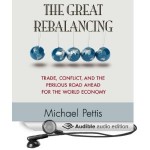The Great Rebalancing by Michael Pettis is a good read. I highly recommend it.
 But I need your input. Blame my deficiencies and bias.
But I need your input. Blame my deficiencies and bias.
Let me explain my deficiency first.
In my last review, on Richard Haass’ book, I mentioned that I listened to that audio book while hitting golf balls. I even listened at 2X narration speed. Politics, history, and foreign policy I can gather and analyze in my sleep.
But when it comes to economic concepts, you hear me say things like, “Huh?”, “Say What?”, “OK so if the… no wait, I mean why is that a concept… I don’t get it.”
So, The Great Rebalancing required some serious thinking time and stopping and starting of the audiobook. My brain and body couldn’t translate between “loading up on my left side to compress the ball” from “surplus and deficit account balances in savings and investments.”
 Let me be clear, though. It’s not Pettis. It’s me.
Let me be clear, though. It’s not Pettis. It’s me.
And I think a lot of us are deficient in the same way I am.
One reason is that many of us have not been trained at a young age to think economically. The other reason is the world is changing so drastically that our foundations for thinking are being destroyed and rebuilt and then changing again.
Thus, I need you to cover me on this one.
Here are my main takeaways from The Great Rebalancing:
Despite overcoming my economic learning disabilities, I understood it. And you realize this book is well written. Pettis is an economic blogger. In the book and on his blog, he breaks down his theories with simple examples. And he delivers specific recommendations and outcomes for the changing US and world economy – that make sense.
The world’s financial upheavals can be viewed through trade imbalances. A trade surplus or deficit will affect the way its economy works and how it relates to other nations.
I hope he’s right, because things would be easier to fix. But I also hope he’s right because it fits with my theory that national economies are more intertwined with the world economy more than we realize. As Pettis writes, the empty houses outside Dublin have a connection to the currency policy of Germans living in the former East Germany.
The US is in better shape than most countries economically. Still, it will not be an easy time because China and the euro could be in for trouble.
China is headed for a downturn or other more severe problems. Pettis covers China; that’s his beat, so I tend to side with him when he says the economic growth and government investment cannot continue at this pace.
He says China needs to increase the value of its currency and create a nation of consumers, not savers, to diminish their trade surplus. He says it will cause inflation and higher unemployment there, but it will help the world economy.
The euro is heading to collapse. Pettis makes a good case for the problems in Europe by examining Germany and Spain. In short, the Germans need to forgive the bad investments they made to Spain and other periphery countries in the EU or watch these countries leave the euro currency because politically they cannot continue with decades of high unemployment and low growth. Those, he says, are the only choices. He seems to be right.
Pettis also makes the case for the dollar no longer being the world’s currency. He calls for a basket of currencies that will create a more even foundation for the growing economies in the developing world. This is something similar the economist Clyde Prestowitz raised a decade ago in his ground breaking book, Three Billion New Capitalists: a currency that included the US, Canada, and Mexico.
Pettis also shows how the dollar as the world’s currency is hurting us financially. We tend to think – gulp, like me – politically rather than economically. It’s somewhat complicated. But here’s how I extrapolate it:
You run a business. Your best salesperson brings in the majority of your profits. You figure, let’s make this homerun hitter the sales manager. After all, the other salespeople can learn from this superstar and they all become superstars. But it doesn’t usually work. The superstar is no longer selling, so he/she brings in less profit. And the superstar can’t teach others. The sales staff stays the same. The company profits drop. Everyone suffers.
It’s the same thing with the dollar. We all think this way: everyone should be on the dollar; it’s the US currency; everyone wants to have the US economy. Somehow I think the world economy is evolving and we need to be competing, not being the basis for everyone else’s transactions.
But unfortunately, like me, we Americans tend to think politically and not economically. And we think it would be a blow to our American ego to not have the world base all its economy on the Almighty Dollar.
Like other authors I have reviewed, one of the themes is this: America needs to change its political system and Constitution to compete or the help the rest of the world compete economically in this new world.
Does that make sense?
Also, should economic theories consider politics? I think Pettis does in this case.
But how much politics should be considered?
And here’s my bias. I don’t think much economic theory has been given the chance to be vetted. My argument has always been that Keynes can’t be properly assessed since no one really saw his theories through. Not many Fed leaders or politicians like to pull the punch bowl from the party. And do we really think the Soviet Union is what Karl Marx — not Groucho — had in mind?
OK, your take.
Comments on this entry are closed.